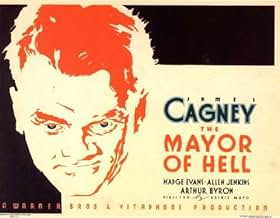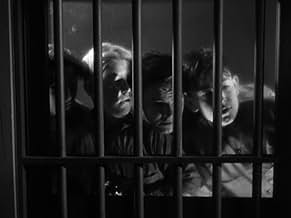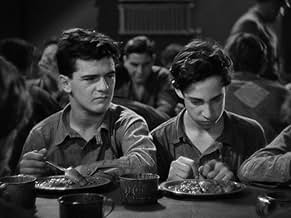ÉVALUATION IMDb
6,9/10
2 k
MA NOTE
Cinq membres d'un gang d'adolescents, dont le chef Jimmy Smith, sont envoyés au centre de réforme de l'État, présidé par l'insensible Thompson.Cinq membres d'un gang d'adolescents, dont le chef Jimmy Smith, sont envoyés au centre de réforme de l'État, présidé par l'insensible Thompson.Cinq membres d'un gang d'adolescents, dont le chef Jimmy Smith, sont envoyés au centre de réforme de l'État, présidé par l'insensible Thompson.
- Directors
- Writers
- Stars
- Prix
- 2 victoires au total
Allen 'Farina' Hoskins
- Smoke
- (as Farina)
G. Pat Collins
- Brandon
- (as George Pat Collins)
Avis en vedette
Racketeer James Cagney takes over a reform school that's being run like a prison. With help from pretty nurse Madge Evans, he turns the place around and helps the boys get back on the right track. But the scummy guy that used to run the school is determined to destroy all the good work they've done, no matter what harm it does to the kids.
Intense, gritty drama that tackles the issue of juvenile crime and how to deal with it. Strong writing with some good characters. Cagney's excellent in one of his best and probably most underrated films. The kid actors are all terrific and believable. Dudley Digges is a particularly evil villain. Backed up by a typically solid WB stable of supporting actors. Jaw-dropping climax is one of the best finishes to any movie of this decade. Remade as Crime School, with Humphrey Bogart and the Dead End Kids. That one's not bad but it's not nearly as powerful as this one.
Intense, gritty drama that tackles the issue of juvenile crime and how to deal with it. Strong writing with some good characters. Cagney's excellent in one of his best and probably most underrated films. The kid actors are all terrific and believable. Dudley Digges is a particularly evil villain. Backed up by a typically solid WB stable of supporting actors. Jaw-dropping climax is one of the best finishes to any movie of this decade. Remade as Crime School, with Humphrey Bogart and the Dead End Kids. That one's not bad but it's not nearly as powerful as this one.
Five years before the film Dead End hit theaters, this film was produced. This was definitely a film that tried to show what reformatories were really like. In most cases, the kids who were sent there didn't become reformed, they only came out harder and moved on to bigger crimes. James Cagney is great in this early role as Patsy, the racketeer who tries to keep the kids from making some of the same mistakes that he did by making conditions better for the boys in the camp. Dudley Digges played the perfect villain in Thompson, the warden of the school. He pretty much showed how when the odds were against Thompson and his cronies that he was nothing more than a coward. Also Allen Jenkins, who ironically would appear a few years later in the aforementioned Dead End, provided a lot of the humor as Patsy's stooge "Uncle Mike". Too bad this little gem is rarely shown on television anymore or that it is currently not out on DVD.
Before the Dead End Kids, there was Frankie Darro. Forgotten today, he epitomized angry desperate youth during those early depression years. Here he comes across with his usual hot-headed intensity, enough to make up for a nonthreatening small size. In fact, Darro acts a lot like a younger version of Cagney, which is no accident since the story line depends on Cagney seeing a lot of himself among the brutalized boys of the reform school. Without that, his transformation from racketeer to reformer makes little sense.
Some good scenes, such as the regimented mess hall with its robotic commands and synchronized quick-step. Also, the movie really comes alive during the well-staged riot scene. The raging mob, flickering shadows and wildly burning torches create a disturbingly hellish scene befitting the title. Still, unless I missed something, the mob really is responsible for the cruel Dudley Digges death, allowing the boys to get away with murder or at least manslaughter no matter how much Digges deserves it. This may be an example of justice prevailing over the law during those pre-code days.
Showing how closely the school's operation is tied to greedy political patronage provides an interesting touch. Nonetheless, Cagney's conversion from corrupt ward healer to the George Washington of a boy's republic remains something of a stretch. And I'm sure the stereotype of the Jewish kid may have brought some chuckles in that day, but not in this post-holocaust period. Then too, the black kid's dad may be a crude stereotype, but the boy isn't, participating importantly in republic activities. Notice how subtly his role emerges, probably so as not to offend some audiences. Still, it was a nervy move for the time. Notice also, how deglamorized the boys are. With the many shapes and sizes, they look as though they were recruited off the streets-- another nice touch.
As in most Warner Bros. pictures of the time, there's an atmosphere of New Deal reform, embodied here by the understanding judge who's willing to try unorthodox methods to remedy social ills. All in all, the film stands as an entertaining period piece, with a humane message that stands the test of time.
Some good scenes, such as the regimented mess hall with its robotic commands and synchronized quick-step. Also, the movie really comes alive during the well-staged riot scene. The raging mob, flickering shadows and wildly burning torches create a disturbingly hellish scene befitting the title. Still, unless I missed something, the mob really is responsible for the cruel Dudley Digges death, allowing the boys to get away with murder or at least manslaughter no matter how much Digges deserves it. This may be an example of justice prevailing over the law during those pre-code days.
Showing how closely the school's operation is tied to greedy political patronage provides an interesting touch. Nonetheless, Cagney's conversion from corrupt ward healer to the George Washington of a boy's republic remains something of a stretch. And I'm sure the stereotype of the Jewish kid may have brought some chuckles in that day, but not in this post-holocaust period. Then too, the black kid's dad may be a crude stereotype, but the boy isn't, participating importantly in republic activities. Notice how subtly his role emerges, probably so as not to offend some audiences. Still, it was a nervy move for the time. Notice also, how deglamorized the boys are. With the many shapes and sizes, they look as though they were recruited off the streets-- another nice touch.
As in most Warner Bros. pictures of the time, there's an atmosphere of New Deal reform, embodied here by the understanding judge who's willing to try unorthodox methods to remedy social ills. All in all, the film stands as an entertaining period piece, with a humane message that stands the test of time.
James Cagney, racketeer and political ward heeler, get to become a Deputy Commissioner of Corrections and visits a boys reform school. The catch is that Cagney is not in it for the graft, he genuinely wants to make a difference in the lives of the kids there because he comes from a background like their's.
The villain of the piece is Dudley Digges who is a grafting chiseler and a sanctimonious hypocrite to boot. One of the subtexts of the plot of The Mayor of Hell is that these kids are mostly immigrants and those that judge them and are in positions of power are those who are here a few generations. Note in the mess hall scene as Digges offers a prayer of thanks for the food they are about to receive, Digges is eating well, but the kids are getting quality you wouldn't feed to your pet.
Cagney has his own troubles back in the city with some of his henchmen and he has to take it on the lam. That puts Digges back in charge and setting up the film for it's climax.
The Mayor of Hell was a typical product from the working class studio. And because it was pre-Code it gets pretty gruesome at times. A later version of this, Crime School, with Humphrey Bogart and the Dead End Kids, was a more sanitized remake.
Although Cagney is fine in the lead role as is Madge Evans the school nurse, the acting honors go to Dudley Digges. Hard to believe that the same man could portray the drunken, but kindly, one legged ship's surgeon in Mutiny on the Bounty. But Digges is a fine player and a joy to watch in every film he's in.
This film is not shown too often because of the racial and ethnic stereotypes it portrays. A whole lot of minorities would be offended today. Still it's a fine film.
Interestingly enough a few years ago the film Sleepers came out and it touched on some of the same issues. I guess films about reform schools don't change in any time.
The villain of the piece is Dudley Digges who is a grafting chiseler and a sanctimonious hypocrite to boot. One of the subtexts of the plot of The Mayor of Hell is that these kids are mostly immigrants and those that judge them and are in positions of power are those who are here a few generations. Note in the mess hall scene as Digges offers a prayer of thanks for the food they are about to receive, Digges is eating well, but the kids are getting quality you wouldn't feed to your pet.
Cagney has his own troubles back in the city with some of his henchmen and he has to take it on the lam. That puts Digges back in charge and setting up the film for it's climax.
The Mayor of Hell was a typical product from the working class studio. And because it was pre-Code it gets pretty gruesome at times. A later version of this, Crime School, with Humphrey Bogart and the Dead End Kids, was a more sanitized remake.
Although Cagney is fine in the lead role as is Madge Evans the school nurse, the acting honors go to Dudley Digges. Hard to believe that the same man could portray the drunken, but kindly, one legged ship's surgeon in Mutiny on the Bounty. But Digges is a fine player and a joy to watch in every film he's in.
This film is not shown too often because of the racial and ethnic stereotypes it portrays. A whole lot of minorities would be offended today. Still it's a fine film.
Interestingly enough a few years ago the film Sleepers came out and it touched on some of the same issues. I guess films about reform schools don't change in any time.
Jimmy Smith leads a group of thieving kids. Jimmy and five others are caught in their hideout and sent to reform school run by the heartless superintendent Thompson. Dorothy, the nurse, is concerned about the conditions. Well-connected street gangster Patsy Gargan (James Cagney) had been appointed deputy commissioner as a political payoff. With no particular interest in the political work, he is tasked to write a report on the school. After witnessing Thompson's brutal treatment, he decides to take an interest in the kids.
This is Cagney playing his good guy gangster. It's solid. The kids are solid pre-Dead End Kids. The morality is pretty simple. My only complaint is nurse Dorothy would never quit. She needs to be outright fired and be carried out kicking and screaming. She's basically abandoning the boys. The guard who gives the boy his coat should be replaced with Dorothy. Patsy's call to Thompson should be replaced with a call to Dorothy. That way the story could still end the same way. This is a very simple moral gangster film.
This is Cagney playing his good guy gangster. It's solid. The kids are solid pre-Dead End Kids. The morality is pretty simple. My only complaint is nurse Dorothy would never quit. She needs to be outright fired and be carried out kicking and screaming. She's basically abandoning the boys. The guard who gives the boy his coat should be replaced with Dorothy. Patsy's call to Thompson should be replaced with a call to Dorothy. That way the story could still end the same way. This is a very simple moral gangster film.
Le saviez-vous
- AnecdotesPatsy is described as a "ward heeler" which is a political operative for a party during an election, mostly involved in vote canvassing. This means Patsy worked to deliver votes from his ward to a particular political machine that was willing to reward him for it.
- GaffesWhen Dorothy goes into her office and locks Patsy out, there is a table outside the door on which four books are resting. In the next shot, a closeup of the table top, there are only two books.
- Citations
Lawyer: Tell us what you know, I said! Never mind what you think!
Mr. Hemingway: Excuse me, boss. I ain't no lawyer. I can't talk without thinkin'.
Meilleurs choix
Connectez-vous pour évaluer et surveiller les recommandations personnalisées
- How long is The Mayor of Hell?Propulsé par Alexa
Détails
- Date de sortie
- Pays d’origine
- Langues
- Aussi connu sous le nom de
- The Mayor of Hell
- Lieux de tournage
- société de production
- Consultez plus de crédits d'entreprise sur IMDbPro
Box-office
- Budget
- 229 000 $ US (estimation)
- Durée1 heure 30 minutes
- Couleur
- Mixage
- Rapport de forme
- 1.37 : 1
Contribuer à cette page
Suggérer une modification ou ajouter du contenu manquant

Lacune principale
By what name was Le Bataillon des sans-amour (1933) officially released in India in English?
Répondre




































